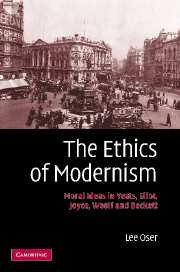Book contents
- Frontmatter
- Contents
- Acknowledgments
- Introduction: literature and human nature
- 1 W. B. Yeats: out of nature
- 2 T. S. Eliot: the modernist Aristotle
- 3 James Joyce: love among the skeptics
- 4 Virginia Woolf: Antigone triumphant
- 5 Samuel Beckett: humanity in ruins
- Conclusion: technology and technique
- Notes
- Works Cited
- Index
5 - Samuel Beckett: humanity in ruins
Published online by Cambridge University Press: 22 September 2009
- Frontmatter
- Contents
- Acknowledgments
- Introduction: literature and human nature
- 1 W. B. Yeats: out of nature
- 2 T. S. Eliot: the modernist Aristotle
- 3 James Joyce: love among the skeptics
- 4 Virginia Woolf: Antigone triumphant
- 5 Samuel Beckett: humanity in ruins
- Conclusion: technology and technique
- Notes
- Works Cited
- Index
Summary
In 1945, after visiting with family in Ireland, Beckett took a position with the Irish Red Cross, who were planning to build a hospital in Saint-Lô. The ruins of the town stood on the Vire River, in Normandy, close to Utah Beach, where the US Fourth Infantry Division came ashore on June 6, 1944. Returning to the continent, Beckett might have associated the name “Lô” with the archetypal Blakean poet, “Los,” or “Los demiurgos,” as Joyce has it (Ulysses 3.18). It is pleasing to think so, for Blake's Los represents the hope of fallen man for apocalyptic rebirth and universal brotherhood.
Beckett's experience at Saint-Lô is expressed in the bold new intimacy of his post-war writing. It is not that his ideas leapt off the track. The predominant philosophical themes, from Democritus, Descartes, Geulincx, Berkeley, and Schopenhauer, run through all stages of his work. But the war deepened the spiritual longing behind his pessimism. It vindicated his apocalyptic ambition. In the dust and rubble of Saint-Lô, a ghastly setting of Dantean intensity, it revealed to him “a vision and sense of a time-honoured conception of humanity in ruins, and perhaps even an inkling of the terms in which our condition is to be thought again.”
Beckett wrote about his experience in Saint-Lô in a radio speech, which I have just quoted, and in a poem with versions in French and English.
- Type
- Chapter
- Information
- The Ethics of ModernismMoral Ideas in Yeats, Eliot, Joyce, Woolf and Beckett, pp. 102 - 119Publisher: Cambridge University PressPrint publication year: 2007



